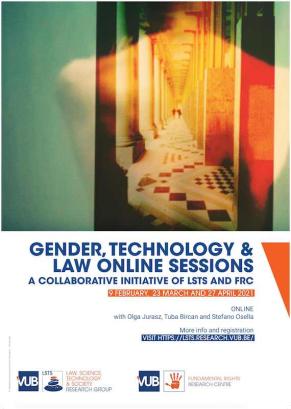The Gender, Technology & Law initiative is happy to announce a new series of online sessions to take place in February, March and April 2021.
The last online session of the current cycle will be animated by Dr. Stefano Osella on 27 April 2021, 12:00-13:30 Brussels time.
FRC Researcher Carlotta Rigotti will open the session.
Session description:
Constitutional Law and Discipline: Fundamental Rights as a Technology of Power
In the presentation, Stefano will address why the Italian Constitutional Court requires trans people to transform their physical, psychological and behavioral characteristics in order to obtain the legal recognition of their gender identity. Furthermore, he will discuss how such a doctrine is implemented. Examining the case-law of the Constitutional Court and of the Court of Cassation in light of queer theory, Stefano will argue that such requirements are intended to benefit the “certainty of legal relations”, a “principle” which, in this specific context, has a paramount connection with the preservation of the heterosexual matrix of family law. Through a Foucauldian analysis of a consistent sample of decisions by courts of first instance, he will demonstrate that the application of such requirements amounts to the exercise of a specific technology of power: discipline. In short, Stefano argue that the doctrine of the Italian Constitutional Court entails the establishment of a disciplinary apparatus, which defines binary gendered subjects in order to maintain the heterosexuality of family law.
Speaker's Bio:
Stefano Osella is a Research Fellow in the Law & Anthropology Department of the Max Planck Institute for Social Anthropology in Halle. Previously, he was a Post-Doctoral Global Fellow at NYU Law School in New York. He holds a Magister Juris from the University of Oxford, and an LLM and a PhD in Law from the European University Institute in Florence. Stefano's main research interest relates to how individual identity is constructed in and through the law. Inspired by his academic and activist experience and personal interests, his investigations focus on how the law defines discrete gender and sexual identities, and how such definitions impact, practically and emotionally, the lives of people for whom such definitions are coined, primarily LGBT and intersex people. Geographically, he concentrates on continental Europe, specifically Germany, Austria, France, and Italy. His research has appeared in the International Journal of Constitutional Law, Bulletin of Latin American Research, Revista Espanola de Derecho Constitucional and Quaderni Costituzionali. He has published blogposts and op-eds in Italian and Spanish.
Gender, Technology & Law Sessions:
This session is part of the Gender, Technologies & Law Sessions, a collaborative initiative of the Law, Science, Technology and Society Research Group (LSTS) and the Fundamental Rights Centre (FRC) at the Vrije Universiteit Brussel. The initiative aims at investigating the intersections between gender, technology and law through an interdisciplinary approach. Outcomes of these investigations but also more explorative debates and open questions are presented in a series of seminars, both by internal and external speakers. For more information on the series, see here.
Previous sessions:
- 9 February 2021, 12:30-14:00 Brussels time
- Olga Jurasz on online gender-based violence
-
23 March 2021, 12:00-13:30 Brussels time
- Tuba Bircan on gender-biased AI
Registration:
The sessions are free to attend but registration is required. To register, please fill in the registration form. Should you face any difficulties with your registration, please send an e-mail to Olga Gkotsopoulou (LSTS) or Carlotta Rigotti (FRC).
You can find the poster of the current cycle here.



